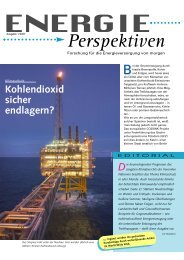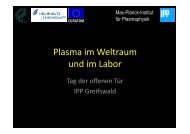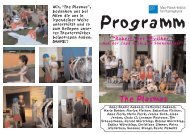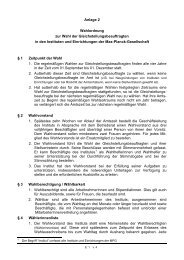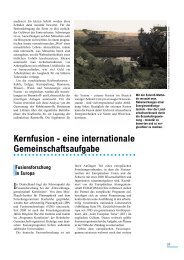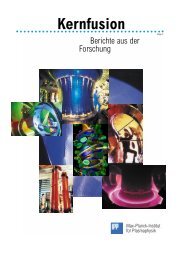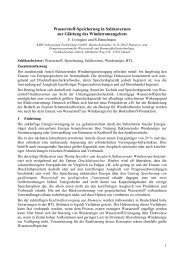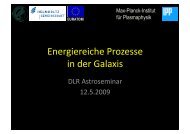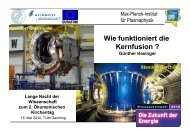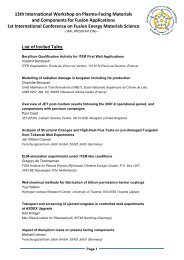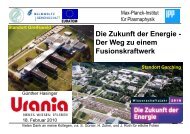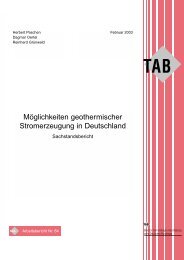IPP Annual Report 2007 - Max-Planck-Institut für Plasmaphysik ...
IPP Annual Report 2007 - Max-Planck-Institut für Plasmaphysik ...
IPP Annual Report 2007 - Max-Planck-Institut für Plasmaphysik ...
Create successful ePaper yourself
Turn your PDF publications into a flip-book with our unique Google optimized e-Paper software.
Figure 2: Basis: a business as usual scenario, CO2-Bound: step by step<br />
reduction of CO emission of 40 %, Solar-City: usage of photovoltaic and<br />
2<br />
solar collector systems.<br />
Malacky<br />
Malacky is a small town in Slovakia close to Bratislava,<br />
which undergoes a tremendous economic growth. The <strong>IPP</strong><br />
develops an energy model especially for Malacky. The main<br />
emphasise of the model will be to describe a population<br />
which expects to increase the per capita income in the next<br />
two decades considerably and a landscape in which major<br />
industries are developed on the green field.<br />
Ungerhausen<br />
A possibility to solve the dilemma between the limited fossil<br />
resources and a growing global energy demand is to build<br />
up local supply concepts. Such regional concepts are mainly<br />
based on the conversion of solar energy, which is theoretically<br />
available in huge amounts. The main focus of this study<br />
is to compare two different conversion concepts of using<br />
solar energy to satisfy the electricity and heating demand of<br />
a model region in consideration of the efficiencies and economical<br />
boundaries.<br />
One concept is to use agricultural land and goods as well as<br />
local wood potentials to produce energy in combined heat<br />
and power processes. Here the analysis of flows of agricultural<br />
products is important, because the energy production<br />
competes with the production of food, e.g. milk or meat. If<br />
the agricultural structure allows for the planting of energy<br />
crops, energy potentials have to be estimated in a realistic<br />
manner and crop rotations have to be followed.<br />
The electricity production by photovoltaics is therefore a more<br />
physical way of converting the solar radiation. The concept<br />
of producing solar hydrogen is a possibility to generate heat<br />
from electricity as well. Comparing both conversion concepts<br />
shows a lot about potentials, consequences and limitations of<br />
the substitution of fossil energy sources. Using combined heat<br />
and power processes is the most effective way to reduce CO 2<br />
emissions. The most efficient way of using the solar energy<br />
is the installation of photovoltaic modules, because biomass<br />
actually converts the solar radiation with efficiency of 1 %.<br />
Energy and System Studies<br />
100<br />
ESCOBALT<br />
The ESCOBALT project was finished in 2008. Results and<br />
findings of the project can be found on the internet. One of<br />
the goals, to create an energy saving network in the Baltic<br />
Sea, was certainly reached. The Baltic Sea region is unique<br />
in its variety for different concepts to supply energy.<br />
Methodologies<br />
Stochastic programming<br />
The German electricity system is expected to undergo major<br />
transitions in the future. Drivers of the expected change are<br />
the political decision to phase out nuclear energy and the<br />
confession to fulfil the Kyoto protocol. But also uncertain<br />
factors like weather conditions or price developments have<br />
an influence on the decision; therefore it is important to perform<br />
risk analyses. With the help of stochastic programming<br />
techniques, such uncertainties can be trapped to a certain<br />
point. A stochastic linear program of the German electricity<br />
system was developed to generate a system causing the<br />
minimal total costs in consideration of uncertainties. The<br />
fuel prices, the CO 2 prices and the wind supply where regarded<br />
as stochastic elements. Within this work the influence<br />
of wind to the existing system was analysed and the<br />
phase out of nuclear energy as well as CO 2 reduction scenarios<br />
were studied.<br />
EPS<br />
The <strong>IPP</strong> helps the European Physical Society to establish a<br />
working group on energy issues. The goal of this working<br />
group is to develop proposals for a sound European energy<br />
research in the field of physics. While the EPS is here certainly<br />
in competition with various other actors, the EPS<br />
offers the chance to develop balanced and independent<br />
views.<br />
Outlook<br />
Energy system studies will certainly become even more<br />
important in the future. The problem remains that talking<br />
about the future requires a very special care and adequate<br />
methodologies. Only work which is well aware of these<br />
methodological deficiencies will be able to make sound and<br />
helpful future outlooks.<br />
Scientific Staff<br />
Group: M. Bartelt (Uni Greifswald), M. Baumann (TU Graz),<br />
F. Botzenhart (Uni Augsburg), S. Braun (Uni Greifswald),<br />
G. Dressler (FH Stralsund), J. Düweke, T. Hamacher,<br />
N. Heitmann, J. Herrmann, M. Krüger (FH Wismar), P. Kurz<br />
(Uni Greifswald), P. Mühlich.



